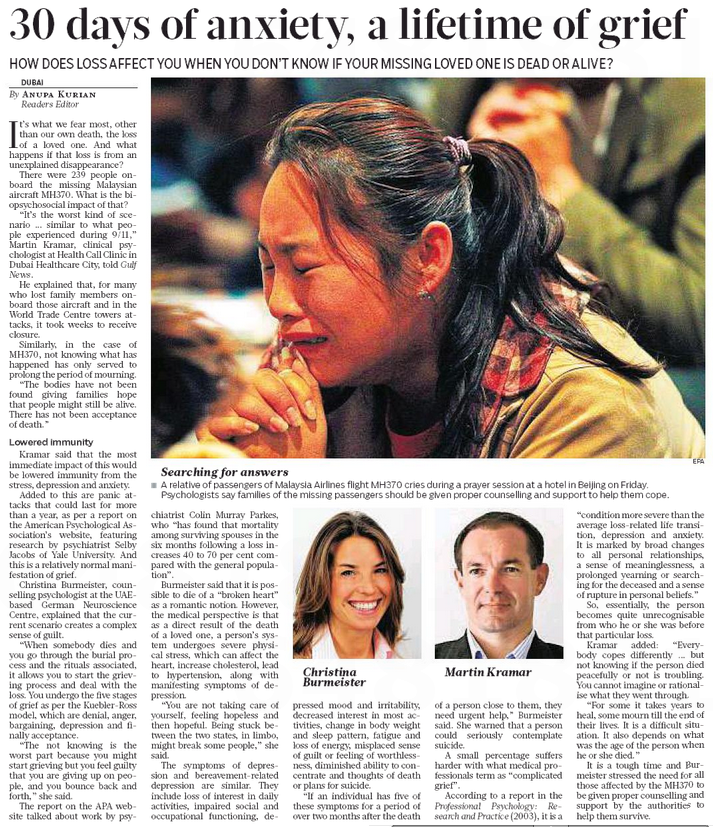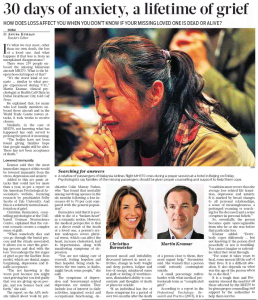
Gulf News: Interview with Dubai Psychologist Christina about Flight MH370 and the impact of loss
How does grief affect when you don’t know if your loved one is dead or alive?
By Anupa Kurian, Readers Editor
Published: 23:08 April 7, 2014
Gulf News
Dubai: It’s what we fear most, other than our own death, the loss of a loved one. And what happens if that loss is from an unexplained disappearance? There were 239 people on-board the missing Malaysian aircraft MH370. What is the biopsychosocial impact of that? “It’s the worst kind of scenario … similar to what people experienced during 9/11,” Martin Kramar, clinical psychologist at Health Call Clinic in Dubai Healthcare City, told Gulf News. He explained that for many who lost their family members on-board those aircraft and in the World Trade Centre towers took weeks to receive closure. Similarly, in the case of MH370, not knowing what has happened has only served to prolong the period of mourning. “The bodies have not been found giving families hope that people might still be alive. There has not been acceptance of death.” Kramar said that the most immediate impact of this would be lowered immunity from stress, depression and anxiety.
Added to this are panic attacks that could last for over a year, as per a report on the American Psychological Association’s website, featuring research by psychiatrist Selby Jacobs of Yale University. And this is a relatively normal manifestation of grief.
Christina Burmeister, counselling psychologist at the UAE-based German Neuroscience Center, explained that the current scenario creates a complex sense of guilt.
Stages of grief
“When somebody dies and you go through the burial process and the rituals associated, it allows you to start the grieving process and deal with the loss. You undergo the five stages of grief as per the Kuebler-Ross model, which are denial, anger, bargaining, depression and finally acceptance.
“The not knowing is the worst part because you might start grieving but you feel guilty that you are giving up on people, and you bounce back and forth,” she said.
The report on the APA website talked about work by psychiatrist Colin Murray Parkes, who “has found that mortality among surviving spouses in the six months following a loss increases 40 to 70 per cent compared with the general population”.
Burmeister said that it is possible to die of a “broken heart” as a romantic notion. However, the medical perspective is that as a direct result of the death of a loved one, a person’s system undergoes severe physical stress, which can affect the heart, increase cholesterol, lead to hypertension, along with manifesting symptoms of depression.
“You are not taking care of yourself, feeling hopeless and then hopeful. Being stuck between the two states, in limbo, might break some people,” she said.
The symptoms of depression and bereavement-related depression are similar. They include loss of interest in daily activities, impaired social and occupational functioning, depressed mood and irritability, decreased interest in most activities, change in body weight and sleep pattern, fatigue and loss of energy, misplaced sense of guilt or feeling of worthlessness, diminished ability to concentrate and thoughts of death or plans for suicide.
“If an individual has five of these symptoms for a period of over two months after the death of a person close to them, they need urgent help,” Burmeister said. She warned that a person could seriously contemplate suicide.
Complicated grief
A small percentage suffers harder with what medical professionals term as ‘complicated grief’.
According to a report in the Professional Psychology: Research and Practice (2003), it is a “condition more severe than the average loss-related life transition, depression and anxiety. It is marked by broad changes to all personal relationships, a sense of meaninglessness, a prolonged yearning or searching for the deceased and a sense of rupture in personal beliefs.”
So, essentially, the person becomes quite unrecognisable from who he or she was before that particular loss.
Kramar added: “Everybody copes differently … but not knowing if the person died peacefully or not is troubling. You cannot imagine or rationalise what they went through.
“For some it takes years to heal, some mourn till the end of their lives. It is a difficult situation. It also depends on what was the age of the person when he or she died.”
It is a tough time and Burmeister stressed the need for all those affected by the MH370 to be given proper counselling and support by the authorities to help them survive.


